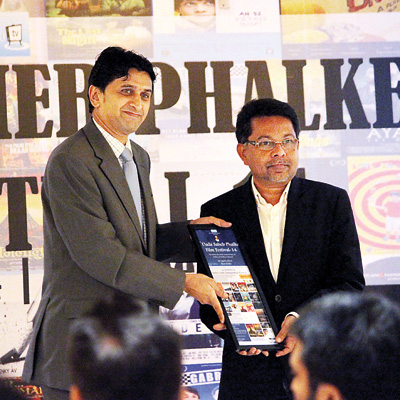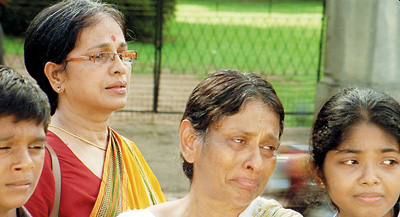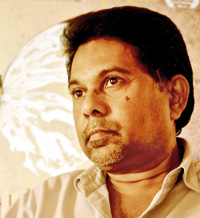Good cinema is good story telling -Nilendra
On an idea struck exactly five years ago on May 19, a day that ended 30 years of war in Sri Lanka Nilendra Deshapriya filmmaker and well-known television professional made his directorial debut ‘Thanha Rathi Ranga’ (Between Yesterday and Tomorrow) a road movie that has already won awards and rave reviews in international film festivals. The film won the Best Film at 4th Dada Saheb Phalke Film Festival 2014 and nominated for the NETPAC Award at Bengaluru International Film Festival 2014, an official selection in World Cinema section at International Film Festival of Kerala and was the official selection at the Chicago South Asian Film Festival 2013.

Nilendra receiving the Best Film award at Dada Saheb Phalke Film Festival
As the latest international feat, the film has been selected for the Panorama section of the 17th Shanghai film festival in China which is starting on June 14. ‘Thanha Rathi Ranga’ is slated to be released at Savoy and Liberty cinemas in Colombo and other EAP circuit cinemas in September. As the movie reaches international recognition, the TV Times spoke to filmmaker Nilendra Deshapriya who described the most essential ingredients to have a flourishing cinema and most important lessons that the aspiring filmmakers must learn.
Q: How does this film emerge and what is it about?
The film began exactly on May 19, 2009, a historical and politically significant day for Sri Lanka. As everyone else did, three friends while celebrating the war victory decided to take a road trip, to areas where the final battle was fought. But within the first 30 minutes or exactly on the 30th minute the film takes a different twist and turn. By genre it is a road movie.
Q: There is an allegation that television has affected the cinema. Being an expert who has introduced new formats to TV while involved in cinema for a long time, how do you view this situation? How do you differentiate the
two mediums?
In the first place I think these are two different mediums. Television is broadcasting and it belongs to mass communication and it’s a domestic tool where you sit on your couch or the bedroom and watch. But films are different and you have to make them for an audience and the audience must come to the cinema. You can always argue that with the technical development you can watch movies on the TV set, computer or even at your handset or mobile. But you don’t get the experience of a darkened theatre without any disturbance or with an uninterrupted audience. Nobody will talk and you will not allow anybody to talk there. But TV is different. You have total control over your audience and the story you are telling. That is the difference.

President
Q: Does the filmmaker have a role to play in a country that is rising from a 30 year bloody long war specially in a context where peace and reconciliation have become the need of the hour?
The director is the one who will have to decide what is going to be expressed by himself or herself. In any country the films that emerge in certain circumstances as you said correctly the postwar Sri Lanka cinema would inevitably have the artistes trying to express themselves. Not only cinema alone but in any form of art and drama or even in painting and theatre. We have seen and are witnessing that this is a part of our post-war lives. This would say how I tried to express myself through the medium which I know most and most I loved and for which I have a place in my heart.
Q: There is an ongoing debate over the problems faced by Sri Lankan cinema. Some of those in the industry is on the view that lack of infrastructure development like digitalization as a main problem.
I think where the cinema is concerned, the most important thing is that of the film that you produce or direct. So the first thing you need to select carefully is your team. You have to be sure that everybody is on the same wave length that they are all trying to make the same film and that they will understand everything that a director tells.
Good cinema, good story I will assure will resolve all these other problems. You are talking about an industry whether you have to digitalise the cinemas or whether you need comforts in the theatres they are all secondary to me where as you have a strong story to tell and a right team to tell that story, people will definitely come and watch. I don’t have to mention names but we have seen many films recently where the collection was concerned or where the industry was concerned. A film in this country can attract an audience of about three million or in terms of money Rs 350 to Rs 400 million. What else do you need to revive an industry with a population of 22 million. Make the right theme the audience will watch it.
Q: There seems to be a wave of cinema where historical stories and tales are recreated for the wide screen. How do you see this trend?
You have to play the game to know what the game is about. So clearly that is how I regard filmmaking is. I will never be able to explain what draws me to a particular project and why the audience is drawn to a particular project. It is only making the film that I can understand why I am making my kind of film and why they are making their kind of films. So I think it’s the game. You have to play the game and that is what is all about. And in time to come or even now the audience is responding in the correct manner to these trends.

Nilendra Deshapriya
Q: Despite film schools or proper education on cinema there is an emerging younger generation attracted to cinema, handling controversial issues in their films. Where does their future success lie?
I think what strike me most about the students and young filmmakers is that they no longer start with short films but they start with commercials and music videos. I think the problem with music videos and commercials as oppose to short films is that the notion of storytelling suffers a great deal. I think they are totally different in primal function, they are losing the notion of what storytelling is. So I think and I strongly recommend they must impress the audiences with novelty of their works. A visual can become a sufficient reason to make a film but above all director’s duty is to have something to say. He or she need to tell a story.
In my opinion to learn to make films not only make films or go to film schools but also to see as many as films as possible. These two considerations are of equal impotence. So my advice for someone who is dreaming of attending a film school is that the opportunity is there to discover all kinds of films that you will never be able to experience in a film school. So watch movies. Learn to make films from what you see.
The cinema is very much evolved in both the film being produced and marketed. I think we have to get our young generation and get them to understand these things which are bigger than a just try 50 copies and satisfy certain section of audience only. You have a wider audience in this globalised village why don’t you try to reach there. It is possible and it is happening now.



